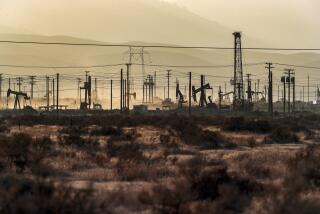U.S. Supreme Court upholds Kern County ban on L.A. sewage sludge
The U.S. Supreme Courtâs refusal to review Los Angelesâ claim that a voter-approved ban on dumping sewage sludge in Kern County violates federal interstate commerce laws has plunged the city into a period of municipal distress over the best way to handle its processed human waste.
The petition aimed to quash a Kern County law known as Measure E, which was approved in 2006 to block shipments from Southern California of more than 450,000 tons a year of treated wastes known as bio-solids to Green Acres, a farm the city bought in 1999 at a cost of about $15 million.
The sludge is tilled into the 4,700-acre farmâs soil to fertilize crops, including corn.
The Supreme Court declined to comment last week, letting stand a previous 9th U.S. Circuit Court of Appeals decision that the city and its allies, including the Orange County Sanitation District, lacked standing to sue under the commerce clause of the U.S. Constitution because the case involved transfers of a commodity from one portion of the state to another.
The case has been sent back to Los Angeles U.S. District Court Judge Gary A. Feess, who must decide whether to maintain jurisdiction over remaining state-level claims or allow a state court to handle them.
Those claims are that Measure E is preempted by the California Integrated Waste Management Act, which requires local agencies to recycle their wastes, including bio-solids, and that it exceeds its own police powers by exerting authority over another government entityâs operations.
Kern County wants Feess to back out of the case, which would require Los Angeles to start all over in state court. Los Angeles would prefer that Feess retain jurisdiction and reaffirm his 2007 ruling that struck down the ban as unconstitutional.
Regardless of Feessâ ultimate decision, Edward Jordan, assistant city attorney for Los Angeles, has no intention of dropping his legal challenges against Measure E.
âOur position is that it would be a waste of judicial resources to have this case fully briefed all over again in state court,â he said. âBut we will re-file in state court if we have to. People have a right to have ballot measures, but local governments cannot go against the State Integrated Waste Management Act.â
Kern County officials said the ban was intended to protect underground water and the local environment from possible contamination and emissions from diesel trucks. However, campaign slogans such as âMeasure E will stop L.A. from dumping on Kern,â and âWeâve got the bully next door flinging garbage over his fence into our yardâ suggested that the law was aimed at slamming the door on Los Angelesâ sludge.
In its petition to the Supreme Court, the city warned that the 9th Circuitâs decision, coupled with the Kern County ban, could unleash discriminatory trade war restrictions among municipalities in the same state. Blocking the transfer of the sludge would also increase air pollution by causing city trucks to haul the waste hundreds of miles to landfills in Arizona at an annual cost of more than $4 million.
âWeâve got a $100-million investment in Green Acres,â said former Los Angeles Deputy City Atty. Keith Pritsker. âThere is no way we are going to walk away from it.â
The case is of particular interest to Steve Fan, manager of the 144-acre Hyperion Treatment Plant, the cityâs oldest and largest wastewater treatment plant.
The plant, just south of Los Angeles International Airport, receives about 350 million gallons of waste water a day via 6,500 miles of sewage lines. The waste is treated with heat and digested by certain strains of bacteria to produce methane gas, which is used to generate electricity and a substance Fan described as âclumpy and very dark with the consistency of wet cake.â
âEach day, 28 trucks depart in the early morning â when there is less traffic â with a total 630 tons of wet cake,â he said. âBy the time it is applied to the land at Green Acres it is a steaming 120 degrees. It meets all state and federal requirements for bacterial counts and heavy metals. The farm is surrounded with a 500-foot-wide buffer zone.â
âWe really try to be good neighbors there,â he said. âThe problem is the general concept, perhaps.â
More to Read
Sign up for Essential California
The most important California stories and recommendations in your inbox every morning.
You may occasionally receive promotional content from the Los Angeles Times.











